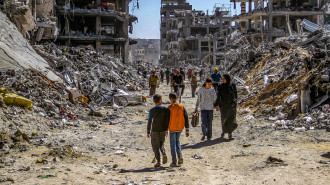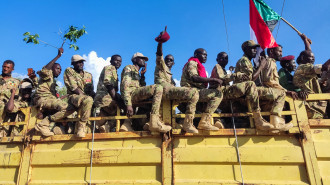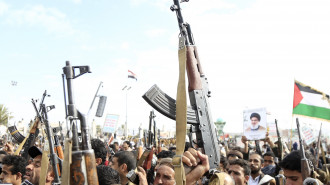Gazans don't want another war, but they won't give up their right to protest
Gazans don't want another war, but they won't give up their right to protest
Instead of stopping protests, the international community should make Israel stop shooting Palestinians, activists tell Ahmed Alnaouq.
4 min read
Palestinians protesting in Gaza frequently come under Israeli fire [Getty]
While Egypt has once again succeeded in brokering a truce between the Israeli army and armed groups in Gaza, the Palestinians trapped inside remain wary and sceptical.
Tareq Essam, an engineer in Gaza, points to a first for the Israeli government - an early, public pronouncement of the killing of a senior officer, shot by Palestinian militants when they discovered an undercover group of Israeli soldiers on a covert spy mission deep within the Strip.
Hamas officials announced on Sunday they believed the Israeli team had been sent to install equipment that would make it easier to eavesdrop on Palestinian government officials.
"I think [Netanyahu's government] admitted this loss to convey a message to the world that Hamas is very dangerous and thus it [Tel Aviv] can be excused if it uses lethal power against us in the next confrontation," predicted Essam, whose brother was killed six months ago when Israeli forces bombed a Hamas government facility.
"And this confrontation will be soon."
This sentiment is common in Gaza, and no wonder. Israeli Defence Minister Avigdor Lieberman resigned in protest over news of a truce, forcing the threat of early elections. Likewise, Naftali Bennett, education minister and head of the settler Jewish Home Party, denounced the ceasefire as "unacceptable" and demanded the now-vacant defence post.
Add to that the results of a new poll of the Israeli public, finding that 74 percent of respondents were dissatisfied with Prime Minister Binyamin Netanyahu's performance in the confrontation with Hamas. News media reported Israelis taking to the streets in Tel Aviv and Sderot to protest the truce, holding posters reading, "Disgrace" and "Bibi, go home". The demonstrations were thought to be the biggest in Israel since the Arab-Israeli war in 1973.
"With his resignation, Lieberman is sending a message to Israelis that he is strong enough to defeat the resistance, so he can win the next elections," speculates Mustafa Middian, a political science student from Gaza at the American University in Cairo.
The ceasefire is just "political theatre" that will stoke public passions and force further action, he and others say, and the two million people of Gaza will pay the price.
Essam and Kamal recall the 2008 and 2012 Israeli wars on Gaza, in which supposed ceasefires were declared, they think, to deceive the Palestinians - only to be followed by prolonged conflicts.
However, other Palestinians in Gaza say a full-blown war is not what Netanyahu thinks is in Israel's best interests right now.
"There are no real objectives that can be achieved with a war at the current time," says journalist Abdelraham Tahrawi. "Eliminating Hamas is not an objective for Israel anymore. It tried to destroy Hamas in the previous wars and failed."
Jonathan Cook, a British journalist based in Ramallah, agrees, but for slightly different reasons. "Netanyahu would rather bolster Hamas, so it can keep a lid on the protests than face an international backlash and demands that he negotiate with the Palestinians," he writes.
"Further, a ceasefire that keeps Hamas in power in Gaza also ensures that Mahmoud Abbas and his Palestinian Authority, based in the West Bank, can be kept out… A disunited Palestine, divided territorially and ideologically, is in no position to exert pressure on Netanyahu - either through Europe or the United Nations - to begin peace talks or concede Palestinian statehood."
No matter what Palestinians in Gaza think about Israel's intentions, most are united in their antipathy towards another war. One of Netanyahu's demands reported during the Egyptian-moderated talks was an end to efforts during the Gaza border protests to breach the fence and shoot fire-tipped balloons into Israeli territory.
Do the youth of Gaza, who now suffer an unemployment rate of 70 percent due to the Israeli blockade, think they should stop their Great Return March, or keep up this form of resistance?
Opinion is predictably mixed about the grand experiment, which launched on March 30.
"I think it's time for the Great Return March to end," says Ali Abusheikh, a writer for WeAreNotNumbers.org, a youth narrative project. "I think it could indeed provoke another war, particularly the flaming balloons, and I see people with crutches wherever I go almost every day now."
Tarneem Hammad, another We Are Not Numbers writer, disagrees: "The Great Return March started as peaceful protests to remind the world of Palestinian refugees' right to return to their homeland. I think the right thing to do is to stop Israel's ruthless response to these peaceful protests instead of stopping the protesters. Everyone has the right to demand their rights."
Middian, the political science student, says "protest is the only voice the people are given".
"Instead of stopping the protests, the international community must stand in the face of Israel and make it stop shooting defenceless Palestinians."
Tareq Essam, an engineer in Gaza, points to a first for the Israeli government - an early, public pronouncement of the killing of a senior officer, shot by Palestinian militants when they discovered an undercover group of Israeli soldiers on a covert spy mission deep within the Strip.
Hamas officials announced on Sunday they believed the Israeli team had been sent to install equipment that would make it easier to eavesdrop on Palestinian government officials.
"I think [Netanyahu's government] admitted this loss to convey a message to the world that Hamas is very dangerous and thus it [Tel Aviv] can be excused if it uses lethal power against us in the next confrontation," predicted Essam, whose brother was killed six months ago when Israeli forces bombed a Hamas government facility.
"And this confrontation will be soon."
This sentiment is common in Gaza, and no wonder. Israeli Defence Minister Avigdor Lieberman resigned in protest over news of a truce, forcing the threat of early elections. Likewise, Naftali Bennett, education minister and head of the settler Jewish Home Party, denounced the ceasefire as "unacceptable" and demanded the now-vacant defence post.
Twitter Post
|
Add to that the results of a new poll of the Israeli public, finding that 74 percent of respondents were dissatisfied with Prime Minister Binyamin Netanyahu's performance in the confrontation with Hamas. News media reported Israelis taking to the streets in Tel Aviv and Sderot to protest the truce, holding posters reading, "Disgrace" and "Bibi, go home". The demonstrations were thought to be the biggest in Israel since the Arab-Israeli war in 1973.
"With his resignation, Lieberman is sending a message to Israelis that he is strong enough to defeat the resistance, so he can win the next elections," speculates Mustafa Middian, a political science student from Gaza at the American University in Cairo.
The ceasefire is just "political theatre" that will stoke public passions and force further action, he and others say, and the two million people of Gaza will pay the price.
Essam and Kamal recall the 2008 and 2012 Israeli wars on Gaza, in which supposed ceasefires were declared, they think, to deceive the Palestinians - only to be followed by prolonged conflicts.
 |
I think [protests] could indeed provoke another war... I see people with crutches wherever I go almost every day now |  |
"There are no real objectives that can be achieved with a war at the current time," says journalist Abdelraham Tahrawi. "Eliminating Hamas is not an objective for Israel anymore. It tried to destroy Hamas in the previous wars and failed."
Jonathan Cook, a British journalist based in Ramallah, agrees, but for slightly different reasons. "Netanyahu would rather bolster Hamas, so it can keep a lid on the protests than face an international backlash and demands that he negotiate with the Palestinians," he writes.
"Further, a ceasefire that keeps Hamas in power in Gaza also ensures that Mahmoud Abbas and his Palestinian Authority, based in the West Bank, can be kept out… A disunited Palestine, divided territorially and ideologically, is in no position to exert pressure on Netanyahu - either through Europe or the United Nations - to begin peace talks or concede Palestinian statehood."
Twitter Post
|
Do the youth of Gaza, who now suffer an unemployment rate of 70 percent due to the Israeli blockade, think they should stop their Great Return March, or keep up this form of resistance?
Opinion is predictably mixed about the grand experiment, which launched on March 30.
"I think it's time for the Great Return March to end," says Ali Abusheikh, a writer for WeAreNotNumbers.org, a youth narrative project. "I think it could indeed provoke another war, particularly the flaming balloons, and I see people with crutches wherever I go almost every day now."
Tarneem Hammad, another We Are Not Numbers writer, disagrees: "The Great Return March started as peaceful protests to remind the world of Palestinian refugees' right to return to their homeland. I think the right thing to do is to stop Israel's ruthless response to these peaceful protests instead of stopping the protesters. Everyone has the right to demand their rights."
Middian, the political science student, says "protest is the only voice the people are given".
"Instead of stopping the protests, the international community must stand in the face of Israel and make it stop shooting defenceless Palestinians."
Ahmed Alnaouq is a Gazan Palestinian writer for We Are Not Numbers currently is based in Cairo, Egypt.





 Follow the Middle East's top stories in English at The New Arab on Google News
Follow the Middle East's top stories in English at The New Arab on Google News


